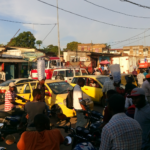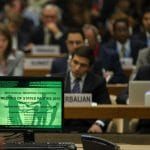More talk, better security: The need for wider debate on strengthening the BWC
By Malcolm Dando | January 17, 2011
A visitor to Ireland was in Cork and needed to get to Dublin quickly, so he asked a local what the best way to drive was. The answer came back after a short pause for thought: “If I was going to Dublin, I wouldn’t start from here.”
There is an old joke that always makes me smile. It goes something like this:
A visitor to Ireland was in Cork and needed to get to Dublin quickly, so he asked a local what the best way to drive was. The answer came back after a short pause for thought: “If I was going to Dublin, I wouldn’t start from here.”
I was reminded of this joke when I was asked recently what I thought might be the outcome of the Seventh Review Conference of the Biological and Toxin Weapons Convention (BWC), which will be held December 5–22, 2011. Despite increasing concerns about bioterrorism and the possible misuse of the rapidly advancing life sciences, the BWC remains an “orphan,” with little high-level political or media attention paid to dealing with the treaty’s obvious weaknesses — the most serious of which are its lack of effective verification measures and a major organization to take care of it between review conferences. At the beginning of 2011, the state of the BWC remains, figuratively speaking, in Cork — we are where we are, rather than where we might like to be.
So how do we forge a more effective path — what are the options for the upcoming review conference, and what are the likely outcomes? A strong, progressive effort to return to the treaty’s core business of verification, such as was made in 1991 at the Third BWC Review Conference, seems unlikely to happen. A complete train wreck, like the Fifth BWC Review Conference in 2001 (when proceedings were suspended due to differences over whether even the mandate for negotiating a legally binding verification instrument should be maintained), also seems unlikely. Some kind of moderate step forward, as was made at the Sixth BWC Review Conference in 2006, is the most likely outcome in 2011, but the question remains about how far moderation can be pushed to deal with the BWC’s many weaknesses.
The underlying problem was described in 2005 by John Freeman, then the UK permanent representative to the Conference on Disarmament in Geneva, in a paper written in the run-up to the Sixth BWC Review Conference. The key issue, he wrote, is how to sustain the norm embodied in the convention: that the life sciences should be used for peaceful purposes only. This requires attention to two different goals. Firstly, Freeman argued, “together and individually, we need to act in ways conducive to the [treaty] retaining its normative authority.” Freeman continued:
Secondly — and this is perhaps the more subtle and ambitious objective — is to ensure that the [BWC] instrument continues to be able to respond to the evolving character of the biological threat. … If reflection by States Party [to the BWC] on the character of the evolving threat does not lead to evolving responses to these threats, then the first objective would be undermined.
Thus, the norm itself would be much weakened. (Freeman went on to consider how the Sixth BWC Review Conference could best enable the striking of a balance between the evolving threat and response, and his paper is well worth reading as a backgrounder before the conference later this year.)
We know that the Seventh BWC Review Conference will be presided over by Dutch Ambassador Paul van den Ijssel and will take place in Geneva, but what are the means of getting from “here to there” — of making solid progress on strengthening the treaty — before the conference ends on December 22? The final declaration of the previous BWC review conference has already provided guidance on this, stating that the 2011 conference should “review the operation of the Convention, taking into account,” among other things:
(i) new scientific and technological developments relevant to the Convention;
(ii) progress made by States Parties on the implementation of the obligations under the Convention; and
(iii) progress of the implementation of the decisions and recommendations agreed upon at the Sixth Review Conference.
No doubt work is already under way at relevant ministries and departments around the world to decide how best to address these points, since the Preparatory Committee meeting for the review conference will be held in Geneva this April 13–15. Although the meeting will deal mainly with procedural issues, it must inevitably also focus participants’ minds on the substantive issues that could be at stake.
It is not difficult to conceive of the kinds of questions that the review conference might deal with. For example, if it is agreed that verification is not possible to achieve, what other mechanisms might increase confidence that BWC state parties are living up to their treaty obligations? One possibility that deserves further exploration is that the annual returns of confidence-building measures — which every BWC member is required to submit — could be developed to improve transparency.
Since 2006, several sensible agreements have been reached on measures that might be used to strengthen the treaty — for example, oversight of research, codes of conduct, and education and awareness-raising for scientists. Can some of these be turned into decisions for BWC members to implement? If so, which should be pursued, given that there will be a very limited time at the December conference to reach decisions? Indeed, it is well worth asking if the system of annual Intersessional Process (ISP) meetings between conferences that have taken place since 2003 could be made more productive. Perhaps these ISP meetings could have more regular agenda items and the power to take decisions where there is clear consensus in order to prevent action from being held up for years — thereby helping to accelerate progress on the BWC.
Another topic likely to arise at the April Preparatory Committee meeting is what should be done about adjusting the convention to cope with the increasing scope and pace of scientific and technological change. Do advances in science and technology relevant to the treaty need to be reviewed more frequently, and if so, how should such review be handled?
In the run-up to the 2006 review conference, there was an interesting and constructive discussion about what best could be achieved. Canada, for example, suggested an “accountability framework” for treaty members to follow, and the London-based group VERTIC proposed strengthening the convention via “modular mechanisms” like creating networks of advisers to help BWC state parties fulfill their treaty obligations. The discussions were, however, conducted within a limited community of experts from state parties and specialists from nongovernmental groups.
This time round, it is necessary to broaden the discussion — including, above all, to talk about the evolving threat and how to respond to it appropriately. I began this column with a jest, but strengthening the BWC is most certainly no joke, and it is essential to global security that we come together to discuss the best ways to do this.
Together, we make the world safer.
The Bulletin elevates expert voices above the noise. But as an independent nonprofit organization, our operations depend on the support of readers like you. Help us continue to deliver quality journalism that holds leaders accountable. Your support of our work at any level is important. In return, we promise our coverage will be understandable, influential, vigilant, solution-oriented, and fair-minded. Together we can make a difference.
Topics: Biosecurity, Columnists















